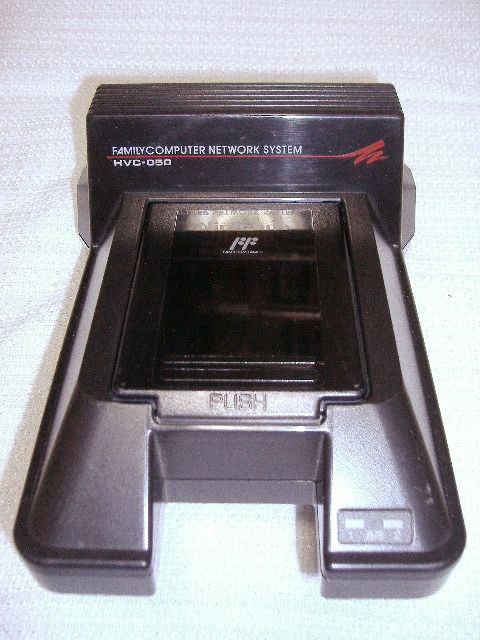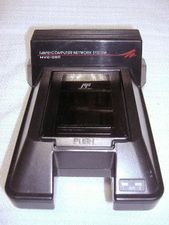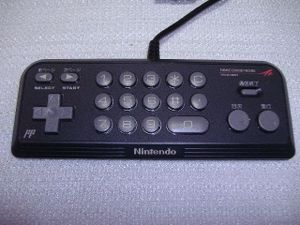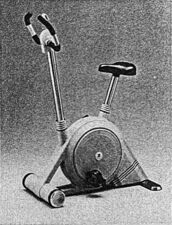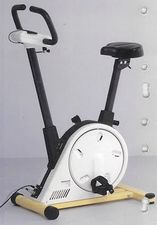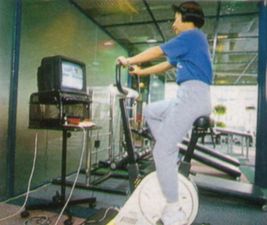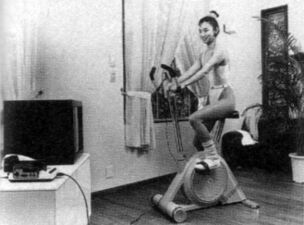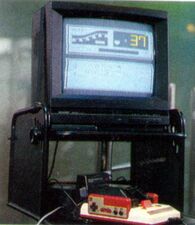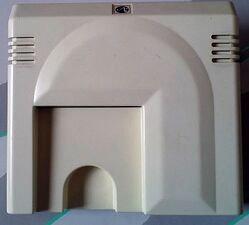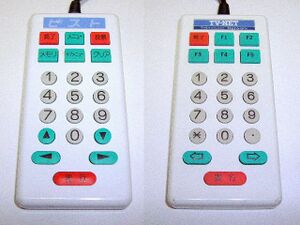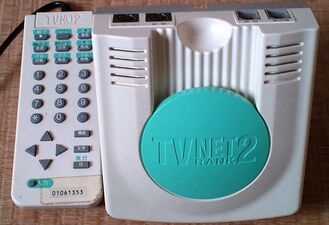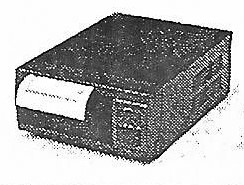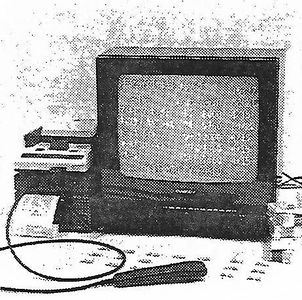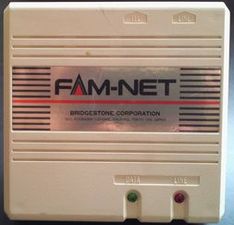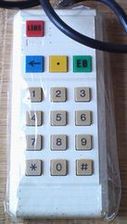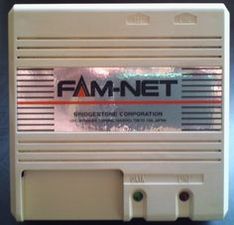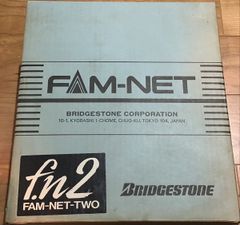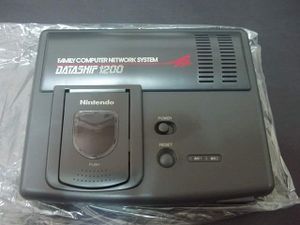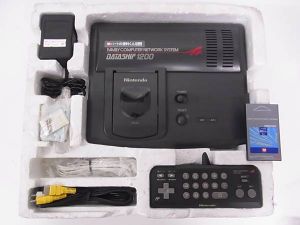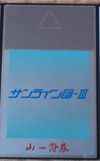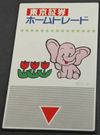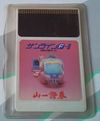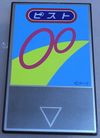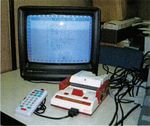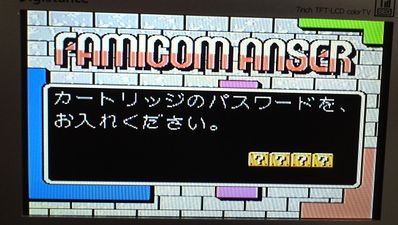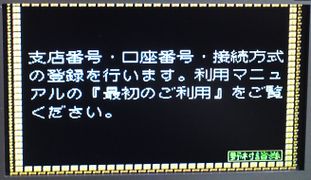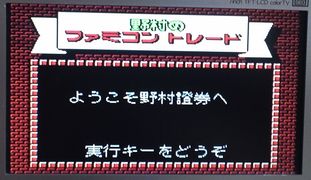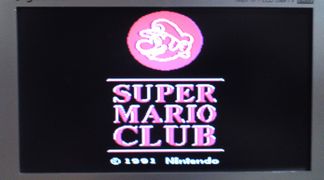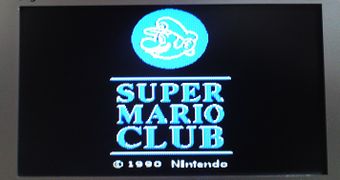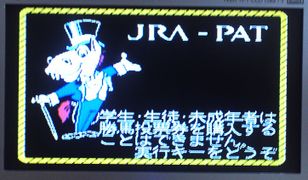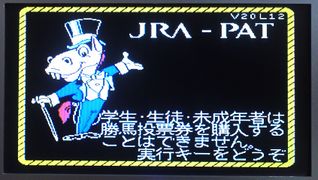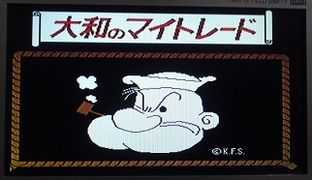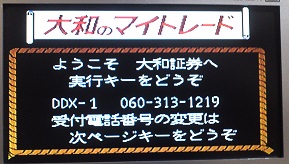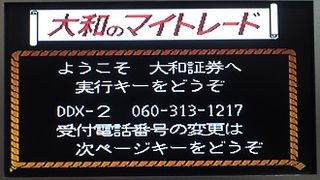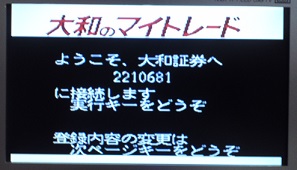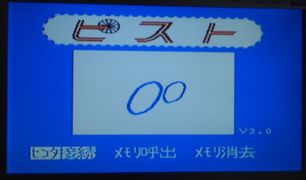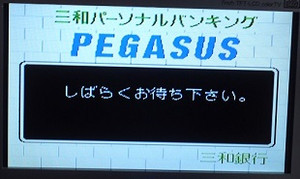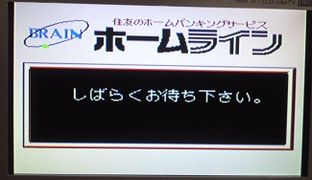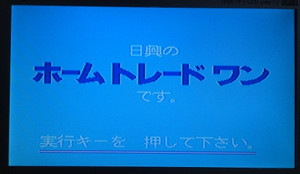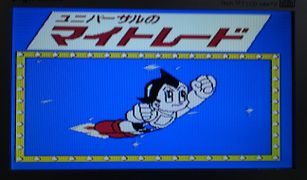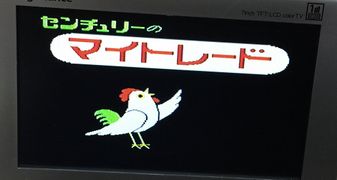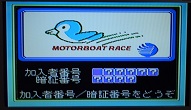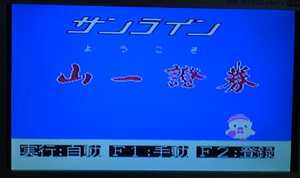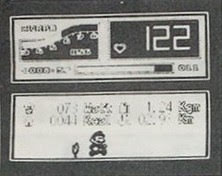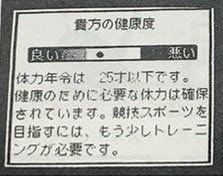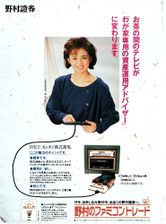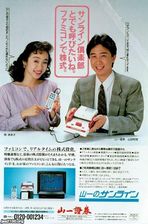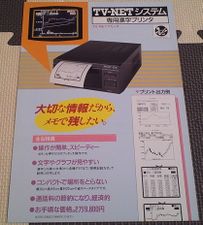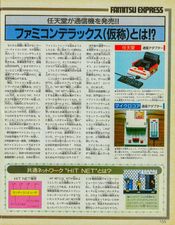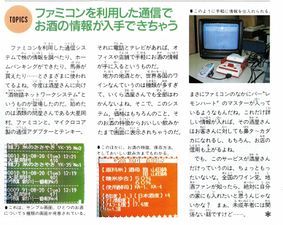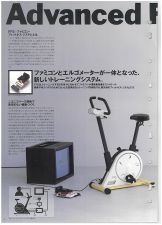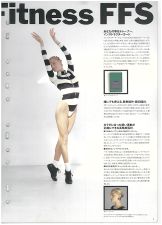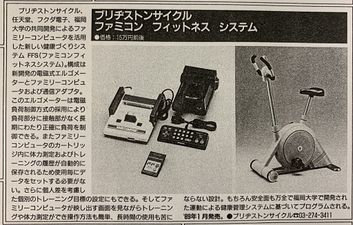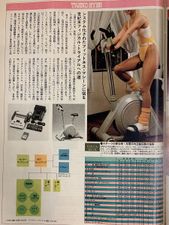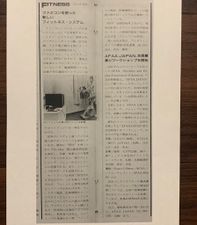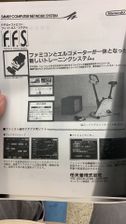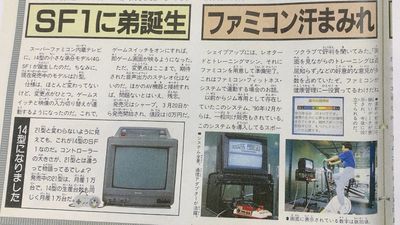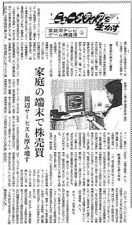Family Computer Network System/TV-NET (partially found ROM and peripherals of telecommunication service for Famicom; 1987-1991)
Family Computer Network System Modem
Status: Partially found
Date found: 2020
Found by: Ben Boldt, Fiskbit, Forest of Illusion
Family Computer Network System and TV-NET is a telecommunication service using Family Computer that was deployed for general consumers from 1988 to 1991. This system allows users to access its services by connecting a telephone line to a dial-up modem and plugging in ROM cartridges dedicated to each content. Each company was joined by a new business using Famicom, and the contents offered by these companies varied mainly from stock trading, account inquiries, horse and bicycle race voting, and mail order sales. However, some in-depth information about this service, such as the companies that entered the market, is unclear. Currently, ROM cartridges and peripherals are sometimes offered on auction sites, but only a few have been found.
History
Birth of services
In 1985, Nintendo president Hiroshi Yamauchi foresaw the future spread of the network society and came up with the idea of a telecommunication service that would allow shopping and stock trading via Famicom. Yamauchi named the service Family Computer Network System and set a goal to realize the service in the fall of 1986.
In July 1987, Yamauchi instructed Masayuki Uemura, General Manager of Nintendo R&D2, to develop a service that would provide stock price information and enable stock trading by connecting a telephone line to a modem dedicated to Famicom in cooperation with Nomura Securities.[1] The service employs a system that can be used by inserting a card-type ROM cartridge, which Nomura named Famicom Trade. In November, the service was tested by 600 monitors, and in July 1988 Nintendo distributed prototype modems and cartridges to each household that had been recruited as testers. As a result, the service was well received, and in September, Nintendo mass-produced the modem and began full-scale service.
In July 28, 1987, Yamaichi Securities, in cooperation with Bridgestone, launched the telecommunication service for Famicom, Sunline F.[2]
In January 1988, Micro Core, in cooperation with Micro Research Institute, NTT, and Bridgestone, developed TV-NET, a telecommunication service modem for Famicom, which was released at the end of February of the same year.
Commercial competition
In January 1988, Daiwa Securities agreed to enter Micro Core's TV-NET and decided in April to develop telecommunication services, followed in May by Yamaichi and then Nikko Securities. From this point on, a commercial conflict between the "Nomura-Nintendo method" and the "Micro Core method" arose over Famicom's communication services. Subsequently, Shin Nihon Securities, Wako Securities, Okasan Securities, and others decided to adopt the Nomura-Nintendo method. Universal Securities, Taiheiyo Securities, and Tokyo Securities decided to adopt the Micro Core method, and various other securities companies entered the Famicom communication service.
On December 7, 1988, Mitsubishi Corporation in cooperation with Daiwa, Yamaichi, Nikko, and Universal, launched the Home Information Network Promotion Council (ホームインフォメーションネットワーク推進協議会) to promote Micro Core-based telecommunication services. In addition to securities companies, city banks, travel agencies, and publishing companies have also decided to enter the market. On October 16, 1989, NTT Data Communications launched its home banking business using Famicom.
In addition, the Ministry of Posts and Telecommunications, a government agency that existed at the time, decided to make NTT's videotex service, Captain System available to Famicom, and Micro Core developed a corresponding modem, TV-NET Rank2, with which the service was launched and modem was released in April 1990. Department stores, mail-order companies, and distance-learning companies have entered the Captain System for Famicom.
Decline in services
Although Famicom's telecommunication service has experienced commercial competition since its launch and has offered a variety of content services, it has not really been accepted by many users and has had some shortcomings. The line connecting to the modem was DDX-TP provided by NTT. However, the condition of the line was unstable, and there was trouble with communication becoming impossible at irregular intervals. Furthermore, if the phone line and the TV were far apart, they were connected by wiring, but in some cases, the user's family members protested that the wiring was in the way and returned the product. Most of the users were only interested in the stock price, and few used other services. In addition, since Famicom was generally positioned as a children's toy, many users were resistant to the idea of adults using toys for stock trading and other activities. By 1991, most users were no longer interested in stock prices due to the bursting of the bubble economy in Japan. It was also time for consoles to move to Super Famicom, and demand was beginning to decline. Finally, the number of households with newly installed modems stopped at 130,000.[3]
ROM dumped
In September 2019, Ben Boldt, a user of the forum site NesDev, obtained a Famicom Network System modem and a JRA-PAT ROM, which he dumped with fellow site user Fiskbit.[4] In addition, Nomura no Famicom Trade and Super Mario Club were also dumped in October-November 2020 and subsequently surfaced at No-Intro. The ROMs were given the file extension FCN, but run is currently impossible because no emulator currently supports the file. In addition, Forest of Illusion obtained the JRA-PAT and Super Mario Club ROMs, dumped them with Hard4Games, and surfaced. The ROMs were NES files, but have not been emulated.[5][6] Fiskbit owns and has dumped most of the currently known Famicom Network System-specific ROMs, but these have not yet surfaced.
Modems, Peripherals
Exclusive modems and ROM cartridges were not sold in stores like video games, but rather modems were ordered by sending an order postcard to the company and cartridges were purchased by applying to the bank.[7] Many of the main modems have been found, but some of their peripherals have not been found to this day.
Family Computer Network System
Status: Found
Family Computer Network System was a telecommunication service modem for Famicom sold by Nintendo in September 1988.
Famicom Fitness System
Status: Lost
Famicom Fitness System is a peripheral device for the Famicom Network System, which was jointly developed by Bridgestone, Nintendo, Fukuda Denshi, and Fukuoka University in 1988 for health management. An ergometer is connected to a communication modem, and a ROM cartridge called an "Instructor Card" is inserted. After inputting data such as age and weight, individual training data is stored in the cartridge. 12 minutes of pedaling measurement is performed, and the system provides the user with the most effective training menu according to the results.
The device was marketed mainly to fitness gyms and medical institutions from January 1989, and was scheduled to be marketed to general households from December 1990, but there is no information that the device was actually sold.
TV-NET, TV-NET Rank2
Status: Found
TV-NET and TV-NET Rank2 are modems for Famicom communication services sold by Micro Core. TV-NET was marketed at the end of February 1988, and like the Famicom Network System, the service can be used by inserting a special cartridge. TV-NET Rank2 was marketed on April 2, 1990, and is a modem compatible with NTT's Captain System, which can be used by calling the center with a dedicated controller.
TV-NET Printer System
Status: Found
TV-NET Printer System is a peripheral device for TV-NET that allows users to print out screens. It was marketed in end of November 1988.
MCB-1
Status: Lost
MCB-1 is a barcode device for TV-NET Printer System and was marketed in September 1988.
FAM-NET, FAM-NET2
Status: Found
FAM-NET and FAM-NET2 are modems developed by Yamaichi Securities in cooperation with Bridgestone for Famicom's telecommunication service, and were marketed in July 1987. FAM-NET did not have a cartridge plug, and the company's service, Sunline F, was built into that modem. FAM-NET2 was marketed in March 1988, where the cartridge plug was added for the first time.
Dataship 1200
Status: Found
Dataship 1200 was a console developed jointly by Nintendo and Dai-ichi Kangyo Bank, mainly for the Famicom telecommunication service, and was marketed in January 1990.[8] It is not possible to play video games on this console.
Services
Famicom's telecommunication services offered were mainly home banking, home trading, and captain system services. While dedicated cartridges existed for the home banking and trading services, they were able to use the services without the basic cartridges for the captain system. But in some cases, it appears that some companies did offer cartridges. Please note that currently, information on companies that have entered the Famicom telecommunications service is often unclear as to which companies offered what services under what name, and which companies that said they were considering entering the service have actually done so.
Home Banking
Home banking using Famicom began with the Home-use Terminal Communications Standardization Council (ホームユース端末通信標準化協議会) launched by NTT Data Communications in March 1989.[9] Thirteen city banks and various regional banks that existed at the time participated in this council, and on October 16, Nomura-Nintendo and Micro Core launched their services as Famicom Anser (ファミコンアンサー) and Bank ANSER TV-NET System (銀行ANSER TV-NETシステム)[10], respectively. The following list is limited to only those banks that have entered the market and for which there is clear information that they have launched their services.
Famicom Network System
| Number | Image | ROM Name | Company | Status |
|---|---|---|---|---|
| FCN000-05 | 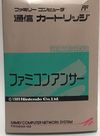 |
Famicom Anser (ファミコンアンサー) | Nintendo | Cart Found ROM Found |
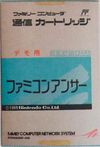 |
Famicom Anser - Demo verison | Nintendo | Cart Found ROM Lost | |
| FCN011-01 | 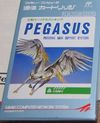 |
Sanwa no Personal Banking - Pegasus (三和のパーソナルバンキング PEGASUS) | Sanwa Bank | Cart Found ROM Lost |
| FCN014-01 | 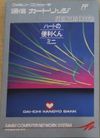 |
Heart no Benrikun Mini (ハートの便利くんミニ) | Dai-Ichi Kangyo Bank | Cart Found ROM Found |
| FCN017-01 | 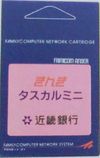 |
Kinki Tasukaru Mini (きんき タスカルミニ) | Kinki Bank | Cart Found ROM Lost |
| FCN019-01 | 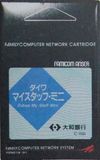 |
Daiwa My Staff Mini (ダイワ マイスタッフミニ) | Daiwa Bank | Cart Found ROM Lost |
| FCN050-01 | 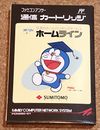 |
Sumitomo no Banking Service - Homeline (住友のバンキングサービス ホームライン) | Sumitomo Bank | Cart Found ROM Found |
| Unknown | Unknown | Famicom Service[11] (ファミコンサービス) | Kyoto Shinkin Bank Kyoto Chuo Shinkin Bank |
Cart Lost ROM Lost |
| Unknown | Unknown | Unknown | Kyowa Bank[12] | Cart Lost ROM Lost |
| Unknown | Unknown | Unknown | Fuji Bank[13] | Cart Lost ROM Lost |
TV-NET
| Image | ROM Name | Company | Status |
|---|---|---|---|
| Unknown | Home Service[14] (ホームサービス) | Kyoto Shinkin Bank | Cart Lost ROM Lost |
Unknown
Unclear which service belongs to Nomura-Nintendo or Micro Core
| Image | ROM Name | Company | Status |
|---|---|---|---|
| Unknown | Famicom Banking Service[15] (ファミコンバンキングサービス) | Nishi Nippon Bank | Cart Lost ROM Lost |
| Unknown | Myline[16] (マイライン) | Osaka Bank | Cart Lost ROM Lost |
| Unknown | Chibagin Famicom Service[17] (ちばぎんファミコンサービス) | Chiba Bank | Cart Lost ROM Lost |
Home Trading
Famicom Network System
| Number | Image | ROM Name | Company | Status |
|---|---|---|---|---|
| FCN001-01 | 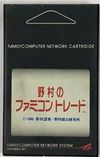 |
Nomura no Famicom Trade (野村のファミコントレード) - Black | Nomura Securities | Cart Found ROM Found |
| FCN001-03 |  |
Nomura no Famicom Trade - Blue | Nomura Securities | Cart Found ROM Found |
| FCN001-05 | 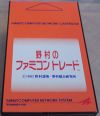 |
Nomura no Famicom Trade - Orange | Nomura Securities | Cart Found ROM Found |
| FCN002-01 | 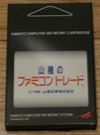 |
Yamatane no Famicom Trade (山種のファミコントレード) | Yamatane Securities | Cart Found ROM Found |
| FCN003-01 | 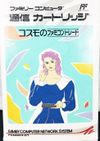 |
Cosmo no Famicom Trade (コスモのファミコントレード) | Cosmo Securities | Cart Found ROM Lost |
| FCN003-03 | Unknown | Cosmo no Famicom Trade | Cosmo Securities | Cart Found ROM Found |
| FCN004-01 |  |
Wako no Famicom Trade (和光のファミコントレード) | Wako Securities | Cart Found ROM Lost |
| FCN004-03 | 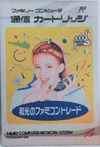 |
Wako no Famicom Trade | Wako Securities | Cart Found ROM Found |
| FCN005-01 | 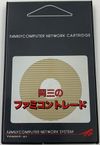 |
Okasan no Famicom Trade (岡三のファミコントレード) | Okasan Securities | Cart Found ROM Found |
| FCN006-01 | 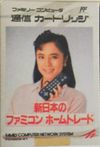 |
Shin Nihon no Famicom Trade (新日本のファミコントレード) | Shin Nihon Securities | Cart Found ROM Lost |
| FCN006-03 |  |
Shin Nihon no Famicom Trade | Shin Nihon Securities | Cart Found ROM Found |
| FCN007-01 | 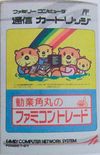 |
Kangyo Sumimaru no Famicom Trade (勧業角丸のファミコントレード) | Kangyo Sumimaru Securities | Cart Found ROM Found |
| FCN008-01 | 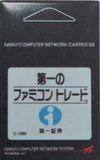 |
Daiichi no Famicom Trade (第一のファミコントレード) | Daiichi Securities | Cart Found ROM Lost |
| FCN009-01 | 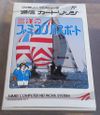 |
Sanyo no Famicom Passport (三洋のファミコンパスポート) | Sanyo Securities | Cart Found ROM Lost |
| Unknown | Unknown | Unknown | Ichiyoshi Securities[18] | Cart Lost ROM Lost |
TV-NET
| Image | ROM Name | Company | Status |
|---|---|---|---|
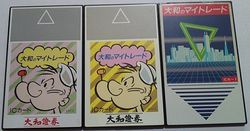 |
Daiwa no My Trade (大和のマイトレード) | Daiwa Securities | Cart Found ROM Lost |
| Sunline F-III (サンラインF-III) | Yamaichi Securities | Cart Found ROM Lost | |
| Nikko no Home Trade One FC (日興のホームトレードワンFC) | Nikko Securities | Cart Found ROM Lost | |
| Universal no My Trade (ユニバーサルのマイトレード) | Universal Securities | Cart Found ROM Lost | |
| Unknown | Nomura no Family Trade[19] (野村のファミリートレード) | Nomura Securities | Cart Lost ROM Lost |
| Tokyo Shōken Home Trade (東京証券ホームトレード) | Tokyo Securities | Cart Found ROM Lost | |
| Century no My Trade (センチュリーのマイトレード) | Century Securities | Cart Found ROM Lost | |
| Unknown | Unknown | Taiheiyo Securities[20] | Cart Lost ROM Lost |
FAM-NET
| Image | ROM Name | Company | Status |
|---|---|---|---|
| Sunline F-II (サンラインF-II) | Yamaichi Securities | Cart Found ROM Lost |
Unknown
| Image | ROM Name | Company | Status |
|---|---|---|---|
| Unknown | Mitsubishi Shōji Gold Trade[21] (三菱商事ゴールドトレード) | Mitsubishi Corporation | Cart Lost ROM Lost |
Captain System
Captain System (キャプテンシステム) was a Videotex service launched by NTT on November 30, 1984. The service using Famicom was launched in April 2, 1990 by the Ministry of Posts and Telecommunications in cooperation with Micro Core. With this service, companies were able to enter the market and mainly sell mail orders, book airline tickets and tickets, and take orders for parcels.
| Image | Service Name | Company/Group | Content | Status |
|---|---|---|---|---|
| Unknown | Post Transfer Home Service[22] (郵便振替ホームサービス) | Ministry of Posts and Telecommunications | Postal Savings, Balance Inquiry for Transfers, Deposit and Withdrawal Details | Lost |
| Unknown | Cattleya AV Club (カトレヤAVクラブ) | Matsuzakaya[23] | CDs sales | Lost |
| Unknown | Unknown | Friendly[24] | Clothing and daily necessities sales | Lost |
| Unknown | Study Box | Fukutake Shoten[25] | Educational materials sales and provision of information on higher education | Lost |
| Unknown | Unknown | Dentsu[26] | Newpaper sales | Lost |
| Unknown | Unknown | Telecom Wakayama[27] | Local specialties sales | Lost |
| Unknown | Unknown | Akita Bank[28] | Home Banking | Lost |
Other
Famicom Network System
| Number | Image | ROM Name | Company | Content | Status |
|---|---|---|---|---|---|
| FCN000-08 | 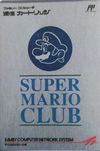 |
Super Mario Club (スーパーマリオクラブ) - Test Version | Nintendo | Video Game Information Service | Cart Found ROM Lost |
| FCN000-09 | 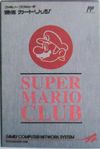 |
Super Mario Club | Nintendo | Video Game Information Service | Cart Found ROM Found |
| FCN026-01 | 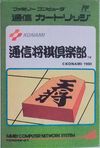 |
Tsūshin Shōgi Club (通信将棋倶楽部) | Konami | Shōgi game | Cart Found ROM Lost |
| FCN027-02 | 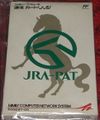 |
JRA-PAT | JRA | Horse racing vote | Cart Found ROM Lost |
| FCN027-03 |  |
JRA-PAT | JRA | Horse racing vote | Cart Found ROM Found |
| FCN027-04 | 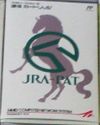 |
JRA-PAT | JRA | Horse racing vote | Cart Found ROM Found |
| FCN027-05 | 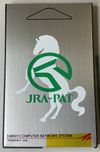 |
JRA-PAT | JRA | Horse racing vote | Cart Found ROM Found |
| FCN027-06 | 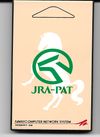 |
JRA-PAT | JRA | Horse racing vote | Cart Found ROM Found |
| FCN030-01 | 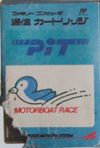 |
PiT - Motorboat Race | National Motor Boat Racing Federation | Boat racing vote | Cart Found ROM Lost |
| FCN030-02 | 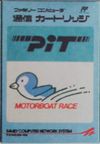 |
PiT - Motorboat Race | National Motor Boat Racing Federation | Boat racing vote | Cart Found ROM Found |
| FCN030-03 | 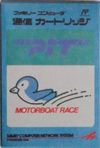 |
PiT - Motorboat Race | National Motor Boat Racing Federation | Boat racing vote | Cart Found ROM Found |
| Unknown |   |
Famicom Fitness System | Bridgestone | Fitness Management | Cart Lost ROM Lost |
| Unknown |  |
Go | Nintendo | Video Game | Cart Lost ROM Lost |
<be>
TV-NET
| Image | ROM Name | Company | Content | Status |
|---|---|---|---|---|
| Pist (ピスト) aka CYCLE-NET[29] | Japan Professional Cyclist Union | Cycle racing vote | Cart Found ROM Lost | |
 |
JRA-PAT | JRA | Horse racing vote | Cart Found ROM Lost |
| Sakemonogatari Network System (酒物語ネットワークサービス) | Ōboshi Okamura | Liquor Information Service | Cart Lost ROM Lost |
<be>
Unknown
EYE-NET PART II
Status: Lost
EYE-NET PART II is a communication service for Famicom of EYE-NET, a PC communication service provided by Fujimic in 1985, but it is not clear whether the service is provided on a cartridge or on the Captain System. The service offered mainly news, lifestyle information, and quizzes.[30][31]
Famicom telecommunication service by Mitsui Group
Status: Lost
In March 1990, the Mitsui Group entered the telecommunication service using Famicom with its then 81 subsidiaries and conducted a monitoring experiment with 200 households.[32][33] The service provided shopping information, event and travel information, and financial product information. However, it is unclear whether this service was provided to Nintendo or Micro Core.
In December 1989, Mitsui's subsidiary at the time, Mitsuigin Software Service, in cooperation with Micro Core, developed "R-Net/FC," a host system that can be connected to Famicom, so it is possible that this service also entered the Micro Core side.
HIT-NET
Status: Existence Unconfirmed
HIT-NET is a common telecommunication service concept that can be used for both Nomura-Nintendo and Micro Core systems, as proposed by NTT.[34] Insurance companies, transportation companies, and others had decided to participate in this concept[35], but there is no record of this concept ever being realized.
Availability
Many of the brokerage firms, city banks, and local banks that started communication services using Famicom have since gone bankrupt or merged, making it very difficult to search for the ROM cartridges they provided. Furthermore, the Captain System was terminated on March 31, 2002, so it can be said to be lost forever.
Gallery
Commercials
Screencaps
Famicom Anser
Nomura no Famicom Trade
Super Mario Club
JRA-PAT (Micro Core)
Daiwa no My Trade
Pist
Sanwa no Personal Banking - PEGASUS
Heart no Benrikun Mini
Sumitomo no Banking Service - Homeline
Nikko no Home Trade One FC
Universal no My Trade
Tokyo Shōken Home Trade
Century no My Trade
PiT
Sunline F
Famicom Fitness System
Ads and Articles
Note
- Because horse race voting was so popular, JRA-PAT remained in use after the decline of the Famicom Network System and was discontinued on July 31, 2015.
- Uemura envisioned video games using telecommunication services and made prototypes of five games, including Go, but cancelled them because they would have required a long phone line connection and could have been too expensive.
External Links
- Family Computer Network System - Wikipedia
- Micro Core Website - Newspaper and Magazine Archives
- ディスクシステム構想
- Jironosuke's Blog 1
- Jironosuke's Blog 2
- Jironosuke's Blog 3
- Jironosuke's Blog 4
- Jironosuke's Blog 5
- Dat-O-Matic - Famicom Network System
References
- ↑ Nintendo Archive Project Retrieved 9 Oct '22
- ↑ Game Machine Issue Sep 1, 1987 Retrieved 9 Oct '22
- ↑ Nikkei Trendy Net Retrieved 9 Oct '22
- ↑ NesDev.org Retrieved 9 Oct '22
- ↑ Forest of Illusion - JRA-PAT Retrieved 9 Oct '22
- ↑ Forest of Illusion - Super Mario Club Retrieved 9 Oct '22
- ↑ ザ☆周辺機器ズ Retrieved 9 Oct '22
- ↑ Nikkan Kogyo Shimbun Issue Jan 5, 1990 Retrieved 9 Oct '22
- ↑ Computer & Network LAN News Issue Apr, 1989 Retrieved 9 Oct '22
- ↑ Data Communication Issue Oct 2, 1989 Retrieved 9 Oct '22
- ↑ Kinyu Keizai Shimbun Issue Nov 27, 1989 Retrieved 9 Oct '22
- ↑ Ginko Shinpo Issue Dec 7, 1989 Retrieved 9 Oct '22
- ↑ Ginko Shinpo Issue Dec 7, 1989 Retrieved 9 Oct '22
- ↑ Kinyu Keizai Shimbun Nov 27, 1989 Retrieved 9 Oct '22
- ↑ Kinyu Keizai Shimbun Issue Dec 4, 1989 Retrieved 9 Oct '22
- ↑ Nikkan Kogyo Shimbun Issue Mar 5, 1990 Retrieved 9 Oct '22
- ↑ Kinyu Keizai Shimbun Issue Dec 11, 1989 Retrieved 9 Oct '22
- ↑ Nikkei Business Issue Jul 2, 1990 Retrieved 2 Jul '90
- ↑ Game Machine Issue Aug 1, 1988 Retrieved 9 Oct '22
- ↑ Nikkan Kogyo Shimbun Isuue Nov 16, 1988 Retrieved 9 Oct '22
- ↑ Nihon Keizai Shimbun Issue Jun 7, 1990 Retrieved 9 Oct '22
- ↑ Tokyo Sports Press Issue Nov 16, 1989 Retrieved 9 Oct '22
- ↑ Nikkei Business Dialy Issue Apr 3, 1990 Retrieved 9 Oct '22
- ↑ Jōmō Shimbun Issue Jan 9, 1990 Retrieved 9 Oct '22
- ↑ Jōmō Shimbun Issue Jan 9, 1990 Retrieved 9 Oct '22
- ↑ Yomiuri Katei Keizai Shimbun Issue May 10, 1990 Retrieved 9 Oct '22
- ↑ Yomiuri Katei Keizai Shimbun Issue May 10, 1990 Retrieved 9 Oct '22
- ↑ Kinyu Keizai Shimbun Issue Feb 26, 1990 Retrieved 9 Oct '22
- ↑ Nikkei Marketing Journal Issue Jul 13, 1989 Retrieved 9 Oct '22
- ↑ Nihon Kogyo Shimbun Issue Jul 13, 1990 Retrieved 9 Oct '22
- ↑ Nikken Business Daily Issue Jul 13, 1990 Retrieved 9 Oct '22
- ↑ Mainichi Shimbun Issue Mar 27, 1990 Retrieved 9 Oct '22
- ↑ Nikkan Kogyo Shimbun Issue May 1, 1990 Retrieved 9 Oct '22
- ↑ Nikken Business Daily Issue Sep 28, 1988 Retrieved 9 Oct '22
- ↑ Game Machine Issue Aug 1, 1988 Retrieved 9 Oct '22
